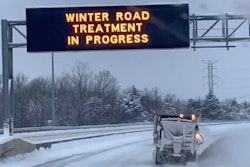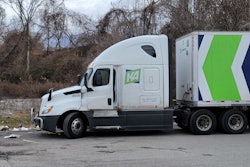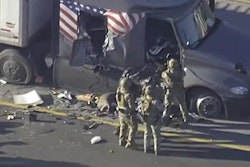Spot market freight moves fast, and brokers and truckers alike often have to think and act quickly to get their cuts. But in the mad rush to book a load, sometimes things get ridiculously dangerous, or maybe just plain dumb.
For example: Brokers enthusiastically agreeing to take on a load of 42,000 pounds of nitroglycerin in IBC totes from Tampa, Florida, to Fresno, California, for just $1.69 a mile.
That's what John A. Rogers sees multiple times a week.
Rogers, a broker, manages freight for a few shippers running a few hundred loads a month -- mostly food, carpeting, and a little hazmat. Even though Rogers isn't a shipper, and does not represent himself as a shipper, he gets cold calls and emails from other brokers looking to take on his book of freight. He's not often impressed by these interactions.
Rogers started to play a little game with the foolhardy. When he gets an email from a broker, he replies something like this:
"Man, you could not have emailed me at a better time. Please quote the following -- Hazmat//Reefer//Temp control 50 degrees (constant) UN3355/IBC Totes/Nitroglycerin//12 totes//#42,000. Tampa FL (33716) to Fresno CA (93725)"
Notice anything off about that? We'll take a closer look later.

In at least two cases Rogers documented in recent LinkedIn posts, the broker goes for it hook, line and sinker.
"Thank you for the rate request," one wrote. "Please be advised that for this lane drivers are asking for $4600-4650. I have word with once of my potential driver and he is willing to do this in $4550. Kindly, advise and let me know." (Please excuse the broker's spelling/grammar errors here.)
Rogers double-checks. "For Hazmat and nitroglycerin? 4550?? Are you sure?"
Maybe really spelling it out more will give pause, return the broker to a more realistic, cautious way of doing business: "This chemical is used in making dynamite. This stuff will explode if it goes over 55 degrees. I have been paying $14,000."
Nope.
"Can you confirm your rate?" Rogers finally asks.
Unshaken, the broker replies: "Please advise when to schedule the pickup for?"
Rogers' other example goes a lot like that, too, but the other broker quotes $4,500, not to be outdone.
Both said they had this load booked at around $1.69/mile.
"I compare the freight business in general to the wild wild west," said Rogers, reflecting on current conditions and recent history. "Sure it's funny, but it brings attention to a real issue."
Let's look at all that's wrong here: The UN ("United Nations" hazmat classification) number is incorrect for nitroglycerin, and nitroglycerin doesn't move in IBC totes. Rogers specifically changed these details to identify the clueless. (Rogers really does quote this lane for hazmat shippers, but he doesn't actually move nitroglycerin.)
"They don’t care," he said. "They’re just trying to get the load. I don't even know if if they’re in America or overseas."
Contrast that with his own approach to freight he's unfamiliar with. The first time he deals with a new chemical, "I want the safety data sheet that tells me everything about the chemical, what the hazard class is. It has the UN number on it, and I cross reference that in my DOT safety book.
"A good hazmat carrier will look that up and see if it’s a commodity they can haul within their insurance," he added. (Overdrive contributor W. Joel Baker, an insurance agent and former working owner-operator, recently contributed this partial breakdown of the basics of how insurance works for different hazmat commodities.)
[Related: An accurate, current MCS-150: More important than you realize]
"No way a legitimate hazmat carrier," who's required to carry $5 million in liability insurance, would haul for the rate suggested, Rogers said. "They would never do that for $4,500 or even $6,000." The brokers are "quoting it like a dry van."
My story last week about double brokering and other fraud, and just how the load boards are attempting to mitigate that particular problem, included a relevant quote from Brent Hutto, the chief relationship officer at Truckstop.
"All the best freight moves in 60 seconds or less in the spot market," Hutto said.
For Rogers, that speed and urgency leads to a lot of the bone-headed broker conduct.
The particular companies in his two examples both had an "elaborate website, but they have no idea what they’re doing," he said. "All these brokerages are commission-driven. If you make a $1,000 spread between what you're charging the customer and you're paying the carrier, those guys might get a 30% commission, so that's $300 to them."
Though it may seem like a small amount, to many millions of people inside the U.S., and many more millions outside, that's big -- the type of cash temptation that might lead one to play a bit fast and loose with what chemical goes into what container and in what trailer.
[Related: 'WTFFMCSA': Double brokers uncovered? Or just sloppy registrations]
"I want to bring attention to this," Rogers said. "If it was a real shipment and you had a shipper where a young girl had just started her first week in the shipping department and she bit on one of these emails, and the carrier wasn't vetted and the broker wasn't on the up and up ... there could be catastrophic consequences," adding that anytime he runs across an example like those shared here, "I share this with my current clients."
His posts on LinkedIn thus work not just as a public service announcement, but a bit of marketing to reassure his shippers he's got their best interests in mind.
"That's why they’re doing business with me," he said. "Maybe I'm not the cheapest, but when it comes down to it, I went out and spent money to get hazmat-certified."
Overdrive reached out to both brokers mentioned in Rogers' post to get their side of the story, but neither would comment.
And yes, if you're wondering why a broker is emailing another broker about a load -- wouldn't that be the ever-hated double brokering? -- Rogers said there's a grey area between double brokering that involves misrepresentation and "co-brokering," where both brokers party to the transaction are above-board about their intentions, generally. More specifically, too, he noted the example of, say, what a freight forwarder might do when a load from Japan gets into the U.S.and is handed off to a domestic broker to arrange transport.
For his part, he said he never co-brokers/re-brokers his loads, though many cold emailing types like those in this story seem eager to. Shippers, he said, get cold emails and calls like this from eager brokers up to 100 times a day.
[Related: The double brokering slow burn: How it happens, and how truckers can fight back]










